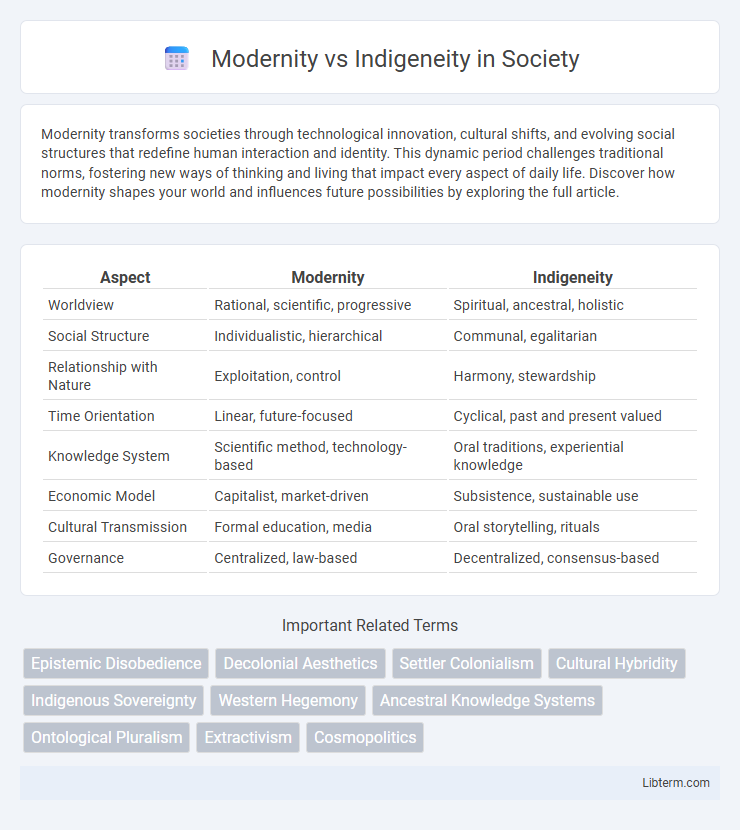Modernity transforms societies through technological innovation, cultural shifts, and evolving social structures that redefine human interaction and identity. This dynamic period challenges traditional norms, fostering new ways of thinking and living that impact every aspect of daily life. Discover how modernity shapes your world and influences future possibilities by exploring the full article.
Table of Comparison
| Aspect | Modernity | Indigeneity |
|---|---|---|
| Worldview | Rational, scientific, progressive | Spiritual, ancestral, holistic |
| Social Structure | Individualistic, hierarchical | Communal, egalitarian |
| Relationship with Nature | Exploitation, control | Harmony, stewardship |
| Time Orientation | Linear, future-focused | Cyclical, past and present valued |
| Knowledge System | Scientific method, technology-based | Oral traditions, experiential knowledge |
| Economic Model | Capitalist, market-driven | Subsistence, sustainable use |
| Cultural Transmission | Formal education, media | Oral storytelling, rituals |
| Governance | Centralized, law-based | Decentralized, consensus-based |
Defining Modernity and Indigeneity
Modernity refers to a historical and cultural condition characterized by technological advancement, industrialization, secularization, and rationality, shaping contemporary societal structures and worldviews. Indigeneity embodies the unique cultural identities, traditions, and epistemologies of Indigenous peoples, rooted in their ancestral connection to specific territories and communal ways of knowing. Defining modernity often involves emphasizing progress and universalism, while indigeneity centers on preservation, relationality, and sovereignty of Indigenous knowledge systems.
Historical Context: The Rise of Modernity
The rise of modernity emerged in the 17th century with the Enlightenment, emphasizing rationality, scientific progress, and industrialization, which transformed societies globally. This historical context positioned Western modernity as a dominant framework, often marginalizing indigenous worldviews and practices rooted in ancestral knowledge and environmental stewardship. The clash between modernity and indigeneity reveals tensions in power, identity, and cultural survival across colonized regions.
Indigenous Worldviews: Core Principles
Indigenous worldviews emphasize a deep interconnectedness between humans, nature, and the spiritual realm, promoting harmony and balance within ecosystems. These core principles often contrast with modernity's focus on progress and individualism by prioritizing collective well-being, ancestral knowledge, and sustainable resource management. Understanding Indigenous epistemologies enriches contemporary discussions on environmental stewardship and cultural resilience.
Points of Tension: Modern Values vs Indigenous Traditions
Modernity often emphasizes progress, individualism, and technological advancement, which can clash with indigenous traditions rooted in communal values, spiritual beliefs, and sustainable practices. Points of tension arise from differing worldviews on land use, governance, and cultural identity, where modern legal frameworks may undermine indigenous sovereignty and customary laws. Navigating these conflicts requires recognizing the legitimacy of indigenous knowledge systems while addressing the pressures of globalization and modernization.
The Impact of Colonialism on Indigenous Societies
Colonialism imposed foreign governance, economic systems, and cultural norms on Indigenous societies, leading to the erosion of traditional knowledge and social structures. The displacement and marginalization caused by colonial powers disrupted community cohesion and undermined Indigenous sovereignty. These colonial legacies continue to affect Indigenous peoples' rights, identity, and access to resources today.
Modernization and Cultural Erosion
Modernization drives technological advancement and urban development but often accelerates cultural erosion among indigenous communities by undermining traditional practices and languages. Indigenous identities face challenges as global economic systems and Western values reshape social structures and belief systems. Preservation efforts prioritize integrating modern tools with cultural revitalization to sustain indigenous heritage amidst rapid modernization.
Indigenous Knowledge in Contemporary Society
Indigenous knowledge systems offer invaluable perspectives on sustainability, community well-being, and environmental stewardship that contrast with modern technological approaches. Contemporary society increasingly recognizes Indigenous knowledge as essential for addressing climate change, biodiversity conservation, and cultural preservation. Integrating Indigenous wisdom with modern practices fosters innovative solutions and promotes respectful coexistence between diverse worldviews.
Cases of Synergy: Blending Modernity and Indigeneity
Blending modernity and indigeneity creates dynamic frameworks where traditional knowledge systems integrate with advanced technologies to address contemporary challenges. In initiatives such as sustainable agriculture in the Amazon and renewable energy projects in Indigenous Canadian communities, indigenous wisdom enhances modern practices, fostering resilience and environmental stewardship. This synergy nurtures cultural preservation while promoting innovation, driving inclusive development rooted in respect for ancestral heritage.
Policy and Rights: Protecting Indigenous Identity
Policy frameworks designed to protect indigenous identity emphasize the recognition of ancestral land rights, cultural heritage preservation, and self-determination. International instruments such as the United Nations Declaration on the Rights of Indigenous Peoples (UNDRIP) provide legal standards for safeguarding indigenous communities against assimilation and resource exploitation. Effective policy implementation requires inclusive governance and respect for indigenous knowledge systems to ensure the survival of their distinct identities in the face of modernity.
The Future: Towards Inclusive Modernities
The future of modernity demands the integration of Indigenous knowledge systems with contemporary technological and social innovations to create inclusive modernities that respect cultural diversity. Emphasizing co-creation and participatory governance ensures Indigenous perspectives shape policy, education, and environmental stewardship, fostering sustainable development that benefits all. This inclusive approach challenges hegemonic narratives, promoting equity and resilience in an interconnected global society.
Modernity Infographic

 libterm.com
libterm.com